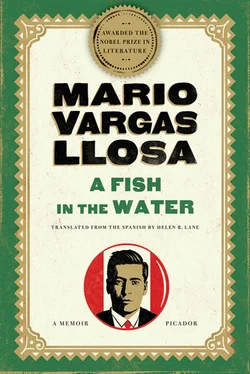Mario Vargas Llosa - A Fish in the Water - A Memoir
Здесь есть возможность читать онлайн «Mario Vargas Llosa - A Fish in the Water - A Memoir» весь текст электронной книги совершенно бесплатно (целиком полную версию без сокращений). В некоторых случаях можно слушать аудио, скачать через торрент в формате fb2 и присутствует краткое содержание. Год выпуска: 2015, Издательство: Macmillan, Жанр: Биографии и Мемуары, на английском языке. Описание произведения, (предисловие) а так же отзывы посетителей доступны на портале библиотеки ЛибКат.
- Название:A Fish in the Water: A Memoir
- Автор:
- Издательство:Macmillan
- Жанр:
- Год:2015
- ISBN:нет данных
- Рейтинг книги:3 / 5. Голосов: 1
-
Избранное:Добавить в избранное
- Отзывы:
-
Ваша оценка:
- 60
- 1
- 2
- 3
- 4
- 5
A Fish in the Water: A Memoir: краткое содержание, описание и аннотация
Предлагаем к чтению аннотацию, описание, краткое содержание или предисловие (зависит от того, что написал сам автор книги «A Fish in the Water: A Memoir»). Если вы не нашли необходимую информацию о книге — напишите в комментариях, мы постараемся отыскать её.
is a twofold book: a memoir of one of Latin America's most celebrated witers, beginning with his birth in 1936 in Arequipa, Peru; and the story of his organization of the reform movement which culminated in his bid for the Peruvian presidency in 1990.
A Fish in the Water: A Memoir — читать онлайн бесплатно полную книгу (весь текст) целиком
Ниже представлен текст книги, разбитый по страницам. Система сохранения места последней прочитанной страницы, позволяет с удобством читать онлайн бесплатно книгу «A Fish in the Water: A Memoir», без необходимости каждый раз заново искать на чём Вы остановились. Поставьте закладку, и сможете в любой момент перейти на страницу, на которой закончили чтение.
Интервал:
Закладка:
The great majority of these shows of support had no ulterior motives, since they happened when, unlike what had gone on before the first round, I wasn’t leading in the opinion surveys and sheer logic indicated that I was going to lose the second round. Those who decided to take that step knew that they risked reprisals in their occupations and in their professional future, since in Peru those who assume power usually tend to be resentful and for their revenge count on the far-reaching hand of the state, which Octavio Paz has rightfully called “the philanthropic ogre”—incapable of providing help to the victims of an earthquake but quite capable of enriching its friends and impoverishing its adversaries.
But not all those professions of support were as honestly motivated as those of a Cecilia Tait or a Gisela Valcárcel. There were others who tried to turn a profit out of their public backing of me, and I fear that, in more than one case, money was involved, despite my having asked those who were financially responsible for the campaign not to spend any funds for that purpose.
One of the most popular TV emcees, Augusto Ferrando, publicly invited me, on one of his series of programs called “Trampolín a la fama”—“Trampoline to Fame”—to join forces and take a gift of food supplies to the prisoners of Lurigancho, who had written him protesting the inhuman conditions of existence in this penitentiary. I agreed to do so, and the PAS readied a truckful of provisions that we took to Lurigancho on May 29, early in the afternoon. I had a gloomy memory of a visit to this prison that I had made several years before, *but now conditions appeared to have become even worse, since in this penitentiary built to hold 1,500 prisoners there were now around 6,000, and among them a fair number accused of terrorism. The visit was therefore frenzied, no more and no less so than society on the outside; the prison was divided between Fujimoristas and Vargasllosistas, who, during the hour that Ferrando and I were there, as the food supplies were being unloaded, insulted each other and tried to drown each other out by shouting refrains and slogans at the top of their lungs. The prison authorities had allowed supporters of the Front to approach the courtyard, which we entered, while our adversaries stayed on the rooftops and against the walls of the prison wings, waving banners and insulting placards. As I spoke, aided by a loudspeaker, I saw the Civil Guards, with their rifles at the ready, aimed at the Fujimoristas on the rooftops, in case there were any shots fired from there or stones thrown our way. Ferrando, who had worn an old watch in case anyone tried to steal it, felt frustrated when none of the Vargasllosistas with whom we mingled tried their luck, and he ended up giving it to the last prisoner who gave him a friendly embrace.
Augusto Ferrando came to see me one night, shortly after that visit to the prison, to tell me that he was prepared, on his program, which had millions of TV viewers in the young towns, to announce that he would leave television and Peru if I didn’t win the election. He was certain that, with a threat like that, countless humble Peruvians, for whom “Trampolín a la fama” was manna from heaven each Saturday, would make me the winner. I gave him my heartfelt thanks, of course, but I remained silent when, in a very vague way, he led me to understand that, by doing a thing like that, he would find himself in a very vulnerable position in the future. When Augusto left, I earnestly entreated Pipo Thorndike not to come to any agreement, for any reason, with the famous TV emcee that might involve any sort of economic reward. And I hope he paid attention to me. The fact is that, on the next Saturday, or the one after that, Ferrando announced, as a matter of fact, that he would end his weekly program and leave Peru if I lost the election. (After June 10, he was as good as his word and moved to Miami. But with his audience clamoring for him, he came back and resumed “Trampolín a la fama,” a turn of events that made me happy: I would not have liked to be the cause of the disappearance of such a popular program.)
The declarations of popular support that most impressed me were the ones of two persons unknown to the general public, who had both suffered a personal tragedy and who, by publicly lending me their support, placed their peace of mind and even their lives in danger: Cecilia Martínez de Franco, the widow of the Aprista martyr Rodrigo Franco, and Alicia de Sedano, the widow of Jorge Sedano, one of the journalists murdered in Uchuraccay.
When my secretaries told me that the widow of Rodrigo Franco had asked for a meeting with me in order to offer me her support, I was dumbfounded. Her husband, a young Aprista leader on very intimate terms with Alan García, had occupied highly important posts within the administration, and when he was murdered by a terrorist commando unit, on August 29, 1987, he was president of ENCI (Empresa Nacional de Comercialización de Insumos: National Enterprise for the Commercialization of Raw Materials), one of the large state corporations. His murder greatly upset the country, because of the cruelty with which it was carried out — his wife and a little son of his very nearly died in the fierce hail of bullets that raked his little house in Naña — and because of the personal qualities of the victim, who, despite being a party politician, was universally respected. I didn’t know him, but I knew about him, through a leader of Libertad, Rafael Rey, a friend and companion of his in Opus Dei. As though his tragic death had not been enough, after his death Rodrigo Franco was subjected to the ignominy of having his name adopted by a paramilitary force of the Aprista administration, which committed numerous murders and attacks against persons and local headquarters of the extreme left, claiming responsibility in the name of the Rodrigo Franco Commando Unit.
On the morning of June 5, Cecilia Martínez de Franco came to see me. I had not met her before either, and I needed only to see her to be aware of the tremendous pressures that she must have had to overcome in order to take that step. Her own family had tried to dissuade her, warning her of what she was exposing herself to. But, making great efforts to control her emotion, she told me that she believed it to be her duty to make such a public statement, since she was certain that, in the present circumstances, that was what her husband would have done. She asked me to summon the press. With great composure, she made her declaration of support for me to the horde of reporters and cameramen who filled the living room; it predictably brought her threats of death, calumny in the press under government control, and even personal insults from President García, who called her a “dealer in corpses.” Despite all this, two days later, on one of César Hildebrandt’s programs, with a dignity that, for a few moments, seemed suddenly to ennoble the regrettable farce that the campaign had turned into, she explained her gesture once again, and again asked the Peruvian people to vote for me.
Alicia Sedano’s public declaration of support for me took place on June 8, two days before the election, without prior announcement. Her unexpected arrival at my house, with two of her children, took both the journalists and me by surprise, inasmuch as since the tragedy of January 1983, when her husband, the photographer for La República , Jorge Sedano, was murdered with seven other of his colleagues by a mob of communal landholders in Ica, in the highlands of Huanta, in a place called Uchuraccay, like all the widows or parents of the victims she had frequently been exploited by the leftist press to attack me, accusing me of having deliberately falsified the facts, in the report of the investigating commission of which I was a part, so as to exonerate the armed forces from being in any way responsible for the crime. The indescribable levels of fraud and filth reached by that long campaign, in the writings of Mirko Lauer, Guillermo Thorndike, and other professional purveyors of intellectual trash, were what had convinced Patricia of how useless political commitment was, in a country like ours, and the reason why she had tried to dissuade me from mounting the speakers’ platform on the night of August 21, 1987, in the Plaza San Martín. The “widows of the martyrs of Uchuraccay” had signed public letters against me, had appeared, always dressed from head to foot in black, at all the demonstrations of the United Left, had been unmercifully exploited by the Communist press, and, during the campaign for the second round, had been made the most of to further his campaign by Fujimori, who seated them in the first row at the Civic Center on the night of our “debate.”
Читать дальшеИнтервал:
Закладка:
Похожие книги на «A Fish in the Water: A Memoir»
Представляем Вашему вниманию похожие книги на «A Fish in the Water: A Memoir» списком для выбора. Мы отобрали схожую по названию и смыслу литературу в надежде предоставить читателям больше вариантов отыскать новые, интересные, ещё непрочитанные произведения.
Обсуждение, отзывы о книге «A Fish in the Water: A Memoir» и просто собственные мнения читателей. Оставьте ваши комментарии, напишите, что Вы думаете о произведении, его смысле или главных героях. Укажите что конкретно понравилось, а что нет, и почему Вы так считаете.












